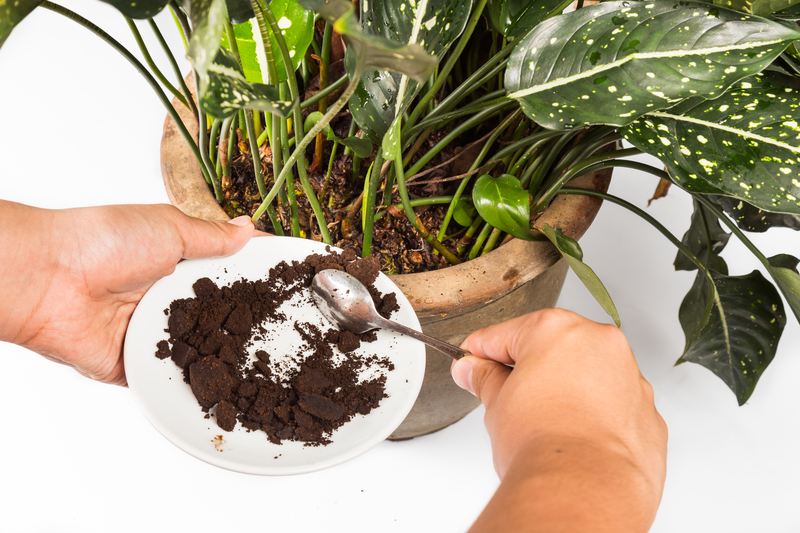Harnessing Organic Waste for Enriched Soil Creation
Posted on 12/09/2025
Harnessing Organic Waste for Enriched Soil Creation: Transforming Waste into Wealth
In a world grappling with mounting waste and depleting soil nutrients, harnessing organic waste for enriched soil creation presents a sustainable, eco-friendly solution. Not only does it address the escalating issue of waste management, but it also revitalizes our soils, promoting agricultural productivity, ecological balance, and environmental health. This comprehensive guide will delve into the process of converting organic waste into nutrient-rich soil, its benefits, methods, and practical tips for individuals, communities, and farmers alike.

Understanding Organic Waste: A Resource, Not Refuse
Organic waste refers to biodegradable material derived from living organisms including food scraps, yard trimmings, paper, manure, and biodegradable municipal solid waste. Often dumped in landfills, this resource can instead enrich soil naturally through decomposition, turning trash into treasure.
- Food waste: Peels, leftovers, coffee grounds, eggshells
- Green waste: Grass clippings, leaves, prunings
- Paper products: Uncoated napkins, cardboard, coffee filters
- Animal manure: Cow, chicken, sheep droppings (excluding pet feces)
Why Organic Waste Matters in Soil Enrichment
When harnessed effectively, these materials provide a rich source of carbon and nitrogen, improving soil texture, fertility, and water retention. They feed beneficial microorganisms, enhance earthworm activity, and boost plant growth - closing the loop in nature's nutrient cycle.
The Science of Organic Waste Decomposition and Soil Creation
The transformation of organic waste into fertile soil relies on a series of natural biological processes known as composting. This process is driven by fungi, bacteria, and invertebrates that break down organic matter, ultimately forming humus--the black gold of gardening.
- Aerobic Composting: Involves decomposers that thrive in the presence of oxygen, producing high-quality, pathogen-free compost.
- Anaerobic Decomposition: Occurs in the absence of oxygen, usually slower and generates methane, a potent greenhouse gas.
- Vermicomposting: Employs worms, particularly red wigglers, to digest organic waste and excrete nutrient-rich castings.
The Role of Soil Amendments from Organic Waste
Amending soil with compost derived from organic matter boosts fertility and structure. It increases nutrient content, particularly nitrogen, phosphorus, and potassium, vital for plant health. Regular addition of compost improves soil pH, encourages microbial biodiversity, and suppresses disease, paving the way for sustainable agriculture and bountiful gardens.
Methods of Harnessing Organic Waste for Enriched Soil Creation
Backyard Composting: A Simple, Household Solution
Backyard composting is a straightforward way for households to minimize waste and enhance garden soil with little effort or expense. Here's how to start:
- Choose a Compost Bin: Select a suitable composting bin or build a pile in a shaded area, ensuring good drainage.
- Add Materials: Alternate 'greens' (nitrogen-rich) like food scraps and grass clippings with 'browns' (carbon-rich) like dead leaves and cardboard.
- Maintain Balance: Layer waste at a ratio of roughly 2:1 browns to greens; too much nitrogen will produce odor, while too much carbon slows down decomposition.
- Aerate Regularly: Turn the pile weekly to introduce oxygen and speed up the breakdown.
- Keep Moist: The pile should be as damp as a wrung-out sponge.
- Harvest Compost: In 2-6 months, the lower layer transforms into dark, crumbly, earthy-smelling compost ready to enrich your soil.
Vermicomposting: Worms at Work
For those with limited space, vermicomposting is an effective method for kitchen scraps:
- Red worms rapidly consume food waste, producing castings packed with plant nutrients.
- Worm bins can be kept indoors, making this method ideal for apartments and urban living.
- Finished vermicompost is a powerful soil amendment that can be added to houseplants and garden beds.
Community Composting: Large-Scale Organic Waste Recycling
Many communities and municipalities are embracing centralized composting facilities, transforming tons of food and yard waste into value-added soil products. These facilities often accept organic waste from:
- Neighborhood food scrap drop-off centers
- Restaurants and businesses
- Schools and community gardens
Municipal compost is then used in parks, landscaping projects, and for soil restoration, closing the nutrient cycle at a regional level.
Agricultural Use: On-Farm Composting and Manure Management
Farmers generate and harness significant volumes of crop residue and animal manure, transforming them into enriched soil amendments:
- Windrow composting: Organic waste is arranged in long rows and periodically turned
- Static pile composting: Waste is piled and aerated passively or with pipes
- Manure composting: Mitigates nutrient runoff, controls odors, and recycles livestock bedding
By returning composted organic matter to their fields, farmers reduce reliance on chemical fertilizers and increase long-term soil health and yield.
Benefits of Creating Enriched Soil from Organic Waste
Environmental Benefits
- Reduces landfill waste: Diverts up to 30% of household trash from landfills, curbing methane emissions.
- Sequesters carbon: Composting locks carbon in soil organic matter, mitigating climate change.
- Improves soil health: Boosts organic matter, microbial life, and biological diversity.
- Restores degraded land: Amends poor soils for reforestation, landscaping, and agriculture.
Economic and Agricultural Advantages
- Cost savings: Reduces need for synthetic fertilizers and soil conditioners.
- Increased crop yields: Improved nutrient availability fosters stronger, healthier plants.
- Supports local economies: Community compost initiatives create jobs and generate marketable products.
Social and Educational Impact
- Promotes sustainability: Empowers individuals and communities to take eco-positive action.
- Educates the next generation: School and youth programs teach environmental stewardship and practical science.
Challenges and Solutions in Harnessing Organic Waste
Overcoming Contamination Issues
Non-compostable items mixed with organics--such as plastics, metal, or glass--can contaminate the finished compost.
- Solution: Public education and clear labelling help ensure that only suitable waste enters the compost stream.
Odors and Pest Prevention
Incorrect composting can attract pests or create foul smells.
- Solution: Maintain proper carbon-to-nitrogen ratios, bury food scraps within the pile, and avoid adding meat, dairy, or oily foods to home compost systems.
Scaling Up and Community Buy-In
Widespread adoption requires investment and participation.
- Solution: Leverage community groups, policy incentives, and business partnerships to expand infrastructure and engagement.
Practical Tips for Starting Your Own Organic Waste Soil Creation System
- Start small: Even a simple worm bin or compost pile makes a big difference.
- Learn & educate: Attend compost workshops or join online communities to hone your skills and share knowledge.
- Track your impact: Weigh your diverted waste to see how much you're keeping from landfill.
- Collaborate: Partner with neighbors or join local composting efforts to maximize impact.

Future Directions: Innovations in Organic Waste Recycling
Emerging technologies are revolutionizing soil creation from organic waste:
- Biochar production: Pyrolyzing organic waste into a stable carbon-rich soil enhancer.
- In-vessel composting: Accelerated decomposition in closed systems, ideal for urban areas.
- Smart bins: IoT-enabled composters monitor moisture, temperature, and progress, making home composting easier than ever.
Globally, cities and farms are collaborating to turn millions of tons of organic waste into valuable products, creating green jobs and restoring soils. The move toward a circular economy, where all resources are reused and recycled, begins with each home, school, business, and farm.
Conclusion:
From Waste to Wealth - Creating Enriched Soil for a Greener Tomorrow
Harnessing organic waste for enriched soil creation is more than a method--it's a movement. By turning kitchen scraps, yard clippings, and farm residues into premium compost and soil amendments, we not only nourish our gardens but also heal our planet. Every bucket of compost you start, every community project you join, is a step toward sustainable agriculture, reduced landfill waste, and healthier ecosystems. The journey from waste to wealth starts today. Dig in and let the soil--and the future--flourish.
Latest Posts
Transform Your Space with 5 Cost-Effective Low Maintenance Garden Tips
Creating a Dog-Friendly Oasis in Your Garden
Transform Your Outdoor Area with Serene Zen Garden Ideas

